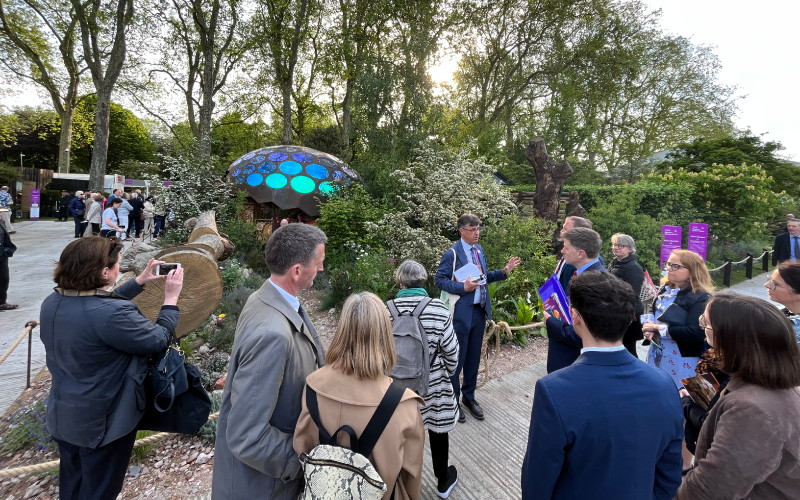
The Association attends the OHRG annual breakfast briefing
Welcoming a record number of parliamentarians, The Ornamental Horticulture Roundtable Group (OHRG) held their breakfast briefing at the Chelsea Flower Show on Tuesday.
The discussions covered all aspects of the challenges and opportunities faced in the horticultural industry. Parliamentarians in attendance included the Gardening All-Party Parliamentary Group chair, Baroness Fookes, MPs from all parties, and the House of Lords Horticulture Inquiry Committee representatives.
The Association highlighted the following policy priorities:
- To include and prioritise green space design in future planning guidelines
- To simplify water abstraction and ease regulations for horticultural, landscaping, and arboricultural businesses
Both policies are essential for unlocking the industry's economic growth potential, aligning with the government's goals regarding biodiversity, access to nature, and local community development.
Analysis shows the potential for an annual gain of £9.6 billion for the UK in health, environmental and social capital by 2030, depending on the extent to which the UK’s green spaces expand or contract. This means that prioritising the planning and design, development and maintenance of green spaces and assets in new housing and promoting the re-greening of urban areas such as around street trees and mixed-use developments, has a direct and tangible benefit for local economies, as well as for mental and physical wellbeing, biodiversity and local carbon capture initiatives.
Access to nature has been proven to have significant and wide-ranging health benefits both for individuals and for communities, and gardens, green spaces, and re-greening initiatives are, for many urban residents, the only point of contact they have to nature.
Wayne Grills, Chief Executive said:
"Recognising the importance of gardens, landscape schemes and green spaces generally in local and national planning policy, and ensuring that water policy supports these policies, is therefore, a crucial area of focus both to unlock the vast economic potential that the environmental horticulture, landscaping and arboriculture industry offers, and to meet several of the government’s economic, social and environmental ambitions."
Each OHRG sub-group identified needs to be addressed by the government – including rising costs to water resilience, investment in agricultural training and the 'Orginal Green Economy' role in fighting against climate change.
The discussions primarily highlighted issues identified in the OHRG's 'Unlocking green growth: A plan from the ornamental horticulture & landscaping industry'.
It establishes how the ‘Growing a green economy: the importance of ornamental horticulture and landscaping to the UK’ report can be brought to life. A document which highlights how we can lead the way on environmental sustainability and provide real impetus to the climate change agenda; how planners can better incorporate green space; how outdoor space can lead to urban renewal and improved human health; how our industry can be at the forefront of exciting new trade opportunities and how we can develop the skills for our future workforce. It also outlines the specific industry commitments that we are prepared to make at this unique moment in the industry’s development.
The Association are working to develop the 'Unlocking green growth' initiatives of ‘Best of British’ - backing UK production and our green spaces and developing urban community renewal.
Backing UK production solutions and our green spaces
Solutions
- Working together to improve the planning system
- Enable access to business improvement funds
- Simplify water abstraction and ease regulations for horticultural and landscaping businesses
- Establish a more significant proportion of British-produced plants in public-sector projects
- Expand the existing tree nursery production grant scheme
- Government and industry working together on a realistic and sustainable peat-removal growing media strategy
- Establish a greater proportion of British-produced plants in public-sector projects
Outcome
- An extra £2.5 billion in direct GDP contributions to the UK economy per year by 2030 through improved capacity, productivity and sustainability
Developing urban community renewal
Solutions
- Review new home building and other urban planning guidelines to ensure sufficient green space is designed into developments and can be maintained
- Industry and government collaborating to integrate nature and gardening into key campaigns – including COP26
- Support people’s physical and mental well-being and back British growers during future pandemics by keeping garden centres open
Outcome
- An extra £1.8 billion in total GDP contributions to the UK economy per year by 2030 by safeguarding the UK’s domestic and non-domestic gardens and green spaces
Read the full Unlocking green growth: A plan from the ornamental horticulture & landscaping industry document here.

